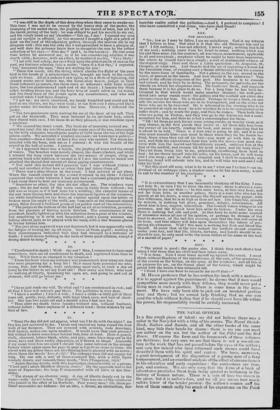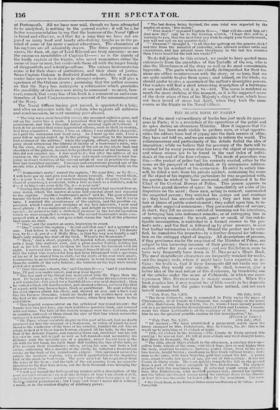THE NAVAL OFFICER
Is a fine rough piece of talent: we did not believe there was a sailor in the Navy-list with a tithe of his genius. The Naval SketchBook, Sailors and Saints, and all the other books of the same kind, may hide their heads for shame : there is no one can meet our author on the sea but the author of the Pilot and the Red ROM'. Of course the form and the framework of these volumes are fictitious; but very sure we are that there is not a sea-adventure in the work that has not passed before the eyes of the ant her; and very few indeed who have witnessed such scenes could have described them with his spirit and vigour. We have, moreover, a good development of the disposition of a young man of a fiery temperament, and an excellent analysis of the effect of circumstances in his education and early experience : the confessions are true, just, and curious. We are only sorry that the form of a book of adventures precludes them from being quoted as testimony in the history of human nature. There is a vein of love too woven in the piece, but it is sailor's love, and we all are aware how much sailors know of the tender passion: the author's women an his love of them smack sadly too much of his experience on the Point • tt Portgmouth. All we have now said, though we have attempted to be analytical, is nothing to the general reader : it will be a far better recommendation to say that the humour of the Naval Officer is broad and effective, and that for a long time we have not enjoyed so many loud and hearty side-shaking Jaughs as in. the pe rusal of some of his more comical adventures. The characters of his captains are all admirably drawn. The three progressive answers, the hum, eh, aye of Lord Edward are truly amusing : so are the enormous taradiddles of Captain G—: so is the inanity of the lordly captain of the frigate, who never remembers either the name of rope or man, but confounds them all with the larger family of thingumbobs and whatd'yecallems. The various lieutenants too come in for their share of portraiture, and their share of justice. Since Captain Oakum in Roderic/ Random, sketches of sea-elmmeter have never been drawn in stronger colours. We will give a specimen of the Oakum genus ; premising that the author assures us that the Navy has undergone a reformation which precludes the possibility of such men now rising to command : we must, however, remark, that every line of his book is a comment on and it con • -firmation of Lord CoaLINGWOOD.S account of the mismanagement of the Navy.
The Naval Officer having just passed, is appointed to a brig; and after an interview wills the captain, who appears all mildness and condescension, he next morning goes aboard.
'The brig was a most beautiful vessel; she mounted eighteen guns, and sat on the water like a duck. I perceived that the pendant was up for punishment, and this I thought rather an unusual sight at Spithead. I took it for granted that some aggravated offence, such as theft or mutiny, had been committed. Seeing I was an officer, 1 was admitted alongside ; so I paid the waterman and went away. As I went up the side, I saw a poor fellow spread-eagled up to the grating 'according to the manners and customs of the natives, while the captain, officers, and ship's company stood witnessing the athletic dexterity of a boatswain's mate, who by the Mien, deep, and parallel marks of the eat on the whole back and shoulders of the patient, seemed to be perfectly master of his business. All this did not surprise me. I was used to it ; but after the address of my captain on the preceding night, I was very much surprised to hear language in direct violation of the second article of war (a practice the captain had inveighed against). Cursings and execrations poured out of his mouth with a volubility equal to any the most accomplished lady on the pier. " Boatswain's mate,' roared the captain, 'Do your deity, or by G —, I will have you up and give you four dozen yourself. One would think, d— n your h— d, that you were brushing flies off a sleeping Venus, instead-of punishing a scoundrel, with a hide as thick as a buffalo's, and be
d— d to him !—do your duty Cir, n your soul.'
" During this elegant address, the unhappy wretch had received four severe dozen, which the master-at-arms had counted aloud and reported to the captain. ' Another boatswain's mate!' said he. The poor creature turned his head over his shoulder, with an imploring look, but it was in vain. I watched the countenance of the captain, and the peculiar expression which I could not decipher at my first interview, I now read most plainly : it was malignant cruelty, and delight in torturing his own species ; he seemed to take a diabolical pleasure in the hateful operation which we were compelled to witness. The second boatswain's mate commenced with a fresh eats and gave a lash across the back of the prisoner that made me start.
" One,' said the master-at-arms, beginning to count.
" One!' roared the captain ; do you call that one ? not a quarter of a one. That fellow is only fit for fly-flapper at a pork shop ! I'll disrate you, by G— d, you d— d Molly Mop ; is that the way you handle a cat? that's only wiping the dust off his back. Where's the boatswain ?'
" Here,' said a stout, gigantic, left-handed fellow, stepping forward, with a huge blue uniform coat, and a plain anchor button, holding his hat in his left ham!, and stroking his hair down his forehead with his right. 1 surveyed this man, as he turned himself about, and concluded that the tailor who worked for him had been threatened with a specimen of his art if he stintect him in cloth, for the skirts of his coat were ample, terminating in an inclined plane, the corners in front being much lower than the middle of the robe behind; the buttons on the hips were nearly pistol-shot asunder. " Give this man a dozen, Sir,' said Captain G—; and if you favour him, I'll put you under arrest, and stop your liquor.' " This last part of the threat had more effect with Mr. Pipes than the first. I le began to peel, as the boxers call it : off came his capacious coat ; a red waistcoat—foil-sized for a Smithfield ox—was next deposited ; then he untied a black silk handkerchief, and showed a throat, covered like that of a goat, with long brown hairs, thick as packthread. He next rolled up his shirt-sleeves above his elbow, and showed an arm and a back very like the Parnese Hercules, which no doubt all my readers have seen at the foot of the staircase at Somerset-house, when they have been to the exhibition.
"This hopeful commentator on the articles of war seized his cat : the handle was two feet long, one inch and three quarters thick, and covered with red baize. The tails of this terrific weapon were three feet long, nine in number, and each of them about the size of that line which covers the springs of a travelling-carriage. " Mr. Pipes, whose scientific display in this part of his art, had no doubt procured for him the warrant of a boatswain, in virtue of which he now stood as the vindicator of the laws of his country, handled his cat like an adept, looked at it from top to bottom, cleaned all the tails, by the insertion of his delicate fingers, and combing them out, stretched out his left leg—for he was left-legged as well as left-handed—and measuring his distance with the accurate eye of a painter, raised his cat high in the air with his left hand, his right hand still holding the tips of the tails, as if to restrain their impatience ; when, giving his• arm and body a full swing, embracing three-fourths of the circle, he inflicted a tremendous stroke on the back of the unfortuuate culprit. This specimen seemed to satisfy the amateur captain, who nodded approbation to the inquiring look of the amateur boatswain. The poor man lost his respiration from the force of the blow ; and the tails of the cat coming from an opposite direction to the first four dozen, cut the flesh diamond-wise bringing the blood at every blow.
" I will not wound the feelings of my readers with a description of the poor wretch's situation : even at this distance of time I am shocked at it, and bitterly lament the painful necessity I have often beets und.,2r of inflietiag similar punishment ; but I hope and trust 1 never did it without a cause, or in the wanton display of arbitrary power.
"The last dozen being finished,' the sum total was reported by the master-at-arms, 'five dozen.'
" Five dozen !' repeated Captain G—, that will do—cast him off ! And now Sir,' said he to the fainting wretch, '1 hope this will be a warning to you, that the next time you wish to empty your beastly mouth, you will not spit on my quarter-deck.' " Heavens !' thought I, is all this for spitting on the quarter-deck ? and this from the moralist of yesterday, who allowed neither oaths nor execrations, and has uttered more blasphemy in the last ten minutes than I have heard for the last ten weeks!'"
To do full justice to this extract, we ought to have quoted more extensively from the anecdotes of this Tartu& of the sea, who is also the Munchausen of the story as well as its most consummate hypocrite. The parts which are chiefly distinguished for their humour are either so interwoven with the story, or so long, that we are quite unable to give them space ; and indeed, on the whole, we should prefer to give a specimen of the author's descriptive powers. Our readers will find a most interesting description of a hurricane at sea and it effects, vol. ii. p. 94-103. The scene is rendered so much the more striking at this moment, as it is the supposed scene of the destrection of two of his Majesty's ships of war, which have not been heard of since last April, when they took the same course as the frigate in the Naval Officer.



















 Previous page
Previous page